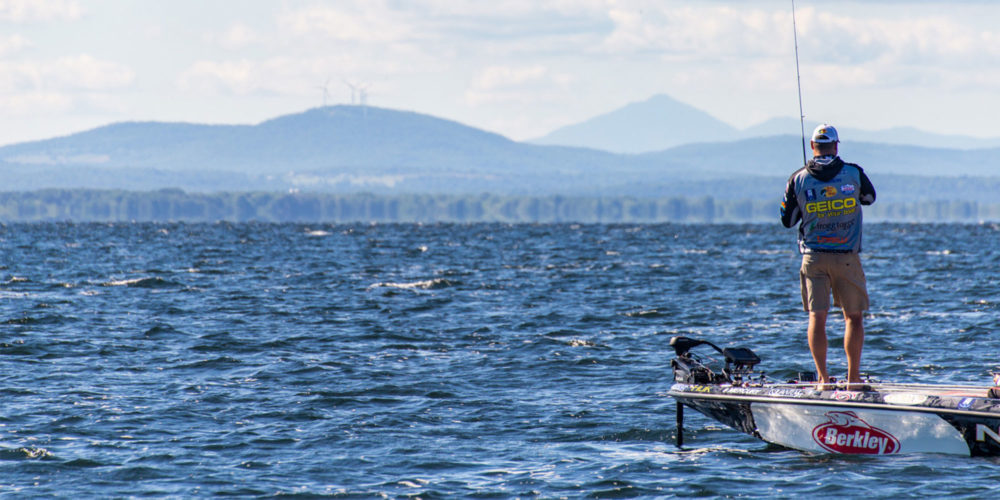Preview: Post Frontal Conditions Call for ‘Bilateral’ Techniques

The 2019 Challenge Select Elimination Round 3 airs Saturday, April 13 on Outdoor Channel from 2-4 p.m. ET.
COLCHESTER, VT – Day one of the 2019 Challenge Select out of Colchester, Vt., featured slick, hot, humid conditions. On day two, Select pros had to fish through a series of downpours as a small front passed through. Now, the final group of Elimination Round anglers will endure a crisp, cool breezier day three.
Such is the frontal cycle of weather systems in the northeast this time of year: warm, balmy, partly cloudy turns to overcast, dark clouds and rain which turns to bluebird and cool with some sort of north wind. It’s cycle that Champlain’s scaly inhabitants ride on a weekly basis. It influences their movements and feeding habits every day.
In the Major League Fishing Select format where anglers have just one day to prove themselves, pros are forced to jump into the frontal cycle, much like jumping into an already rotating jump rope. They do not have the luxury of following a weather pattern through practice and into the tournament to jump in sync with it. Instead, they have to look at the skies, feel the wind and make a guess as to where the fish are in the weather cycle.
For some, such conditions makes the largemouth versus smallmouth decision on Lake Champlain a little dicey. For example, Select pro Randy Howell, who has fished Champlain multiple times over the years, was wringing his hands over the clear blue skies on day three.
“Man, my mind is spinning a 100 mph right now,” Howell said. “I want to go fish for largemouth, but this a smallmouth day if I have every seen one: sunny and breezy; those jokers gang up and bite on days like this. Gosh, I just don’t know what to do. I guess I’ll start back in a largemouth place and if it doesn’t work out in the first period, I’ll have to join the smallmouth race on the Scoretracker.”
Todd Faircloth, who has fished Champlain about four times, was also torn due to the conditions.
“I like the zone we’re in; it has plenty of shallow vegetation, so both species will be in play here,” he said. “The zone includes an area I’ve done well in with largemouths in previous tournaments. I’m more comfortable fishing for largemouths, but these conditions are going to favor the smallmouth guys for sure. And that’s not to say these conditions totally shut largemouth down – it positions them pretty well. This format rewards numbers, though, and that’s why smallmouth might be a stronger play today.”
Marty Robinson was sorting through particular color jerkbaits in his boat just before launch. His starting strategy was pretty cut and dry.
“I see sun; I see wind,” he stated. “Looks like a jerkbait day for smallies to me.”
The only angler who seemed totally at ease with the conditions was none other than James Watson, who always uses the morning pre-launch time as a stand-up comedy improv session for any one willing to listen to his shenanigans.
“It doesn’t bother me at all,” Watson said of the postfrontal conditions while struggling to hold a straight face. “See, when it comes to fishing, what a lot of people don’t realize about me is that I’m bilateral. That’s a fishing term that means I have a natural talent to catch both species at the same time – as in, I can catch largemouth and smallmouth bilaterally, if you will.”
Then without breaking stride, Watson added, “I’m also bilingual, which means I can catch them in two languages as well, but I don’t think I’m going to need that today. Catching them bilaterally should work out just fine for me today. I’m saving by bilingualness for later in the week. You’ve always got to have an ace up your sleeve with these guys.”